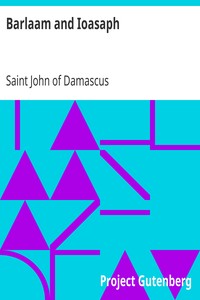Barlaam and Ioasaph by Saint John of Damascus
"Barlaam and Ioasaph" by Saint John of Damascus is a religious narrative likely written in the 8th century. The story serves as an allegorical retelling of the life of Buddha, interwoven with Christian themes, focusing on the protagonist, Ioasaph, and his journey towards enlightenment through Christ's teachings. The text explores profound philosophical and theological questions about morality, the nature of existence, and the quest for true happiness and fulfillment. The opening of
"Barlaam and Ioasaph" sets the stage in a land referred to as Ind, where the fervent rise of Christianity faces the challenges posed by a king named Abenner, who is deeply troubled by his childlessness. Amidst this turmoil, the faith of many monks flourishes, drawing the ire of the king, who authorizes persecutions against them. Within this context, the narrative introduces key characters, including a nobleman who forsakes worldly attachments to embrace monastic life, leading to a dramatic confrontation with the king. The text delves into themes of spirituality, suffering, and the eternal conflict between faith and worldly desires, foreshadowing Ioasaph's quest for wisdom, guided by the wisdom of Barlaam. (This is an automatically generated summary.)
Read or download for free
| How to read | Url | Size | |||
|---|---|---|---|---|---|
| Read now! | https://www.gutenberg.org/ebooks/749.html.images | 501 kB | |||
| EPUB3 (E-readers incl. Send-to-Kindle) | https://www.gutenberg.org/ebooks/749.epub3.images | 259 kB | |||
| EPUB (older E-readers) | https://www.gutenberg.org/ebooks/749.epub.images | 267 kB | |||
| EPUB (no images, older E-readers) | https://www.gutenberg.org/ebooks/749.epub.noimages | 249 kB | |||
| Kindle | https://www.gutenberg.org/ebooks/749.kf8.images | 466 kB | |||
| older Kindles | https://www.gutenberg.org/ebooks/749.kindle.images | 446 kB | |||
| Plain Text UTF-8 | https://www.gutenberg.org/ebooks/749.txt.utf-8 | 476 kB | |||
| Download HTML (zip) | https://www.gutenberg.org/cache/epub/749/pg749-h.zip | 254 kB | |||
| There may be more files related to this item. | |||||
Similar Books
About this eBook
| Author | John of Damascus, Saint, 676?-749 |
|---|---|
| Translator | Mattingly, Harold, 1884-1964 |
| Translator | Woodward, George Ratcliffe, 1848-1934 |
| Title | Barlaam and Ioasaph |
| Credits | Produced by Douglas B. Killings. HTML version by Al Haines. |
| Reading Level | Reading ease score: 65.1 (8th & 9th grade). Neither easy nor difficult to read. |
| Language | English |
| LoC Class | PQ: Language and Literatures: Romance literatures: French, Italian, Spanish, Portuguese |
| Subject | Gautama Buddha -- Legends -- Adaptations |
| Subject | Christian saints -- India -- Romances |
| Subject | Princes -- India -- Romances |
| Category | Text |
| EBook-No. | 749 |
| Release Date | Dec 1, 1996 |
| Most Recently Updated | Jan 1, 2021 |
| Copyright Status | Public domain in the USA. |
| Downloads | 526 downloads in the last 30 days. |
| Project Gutenberg eBooks are always free! | |

